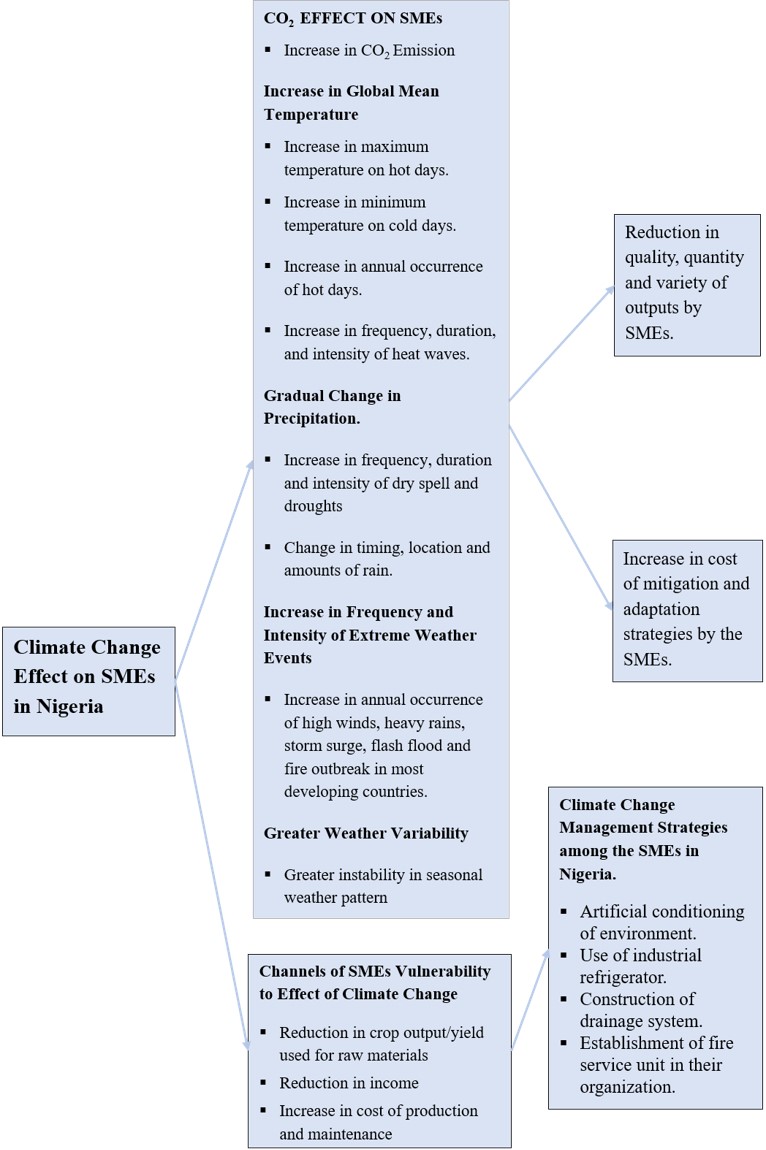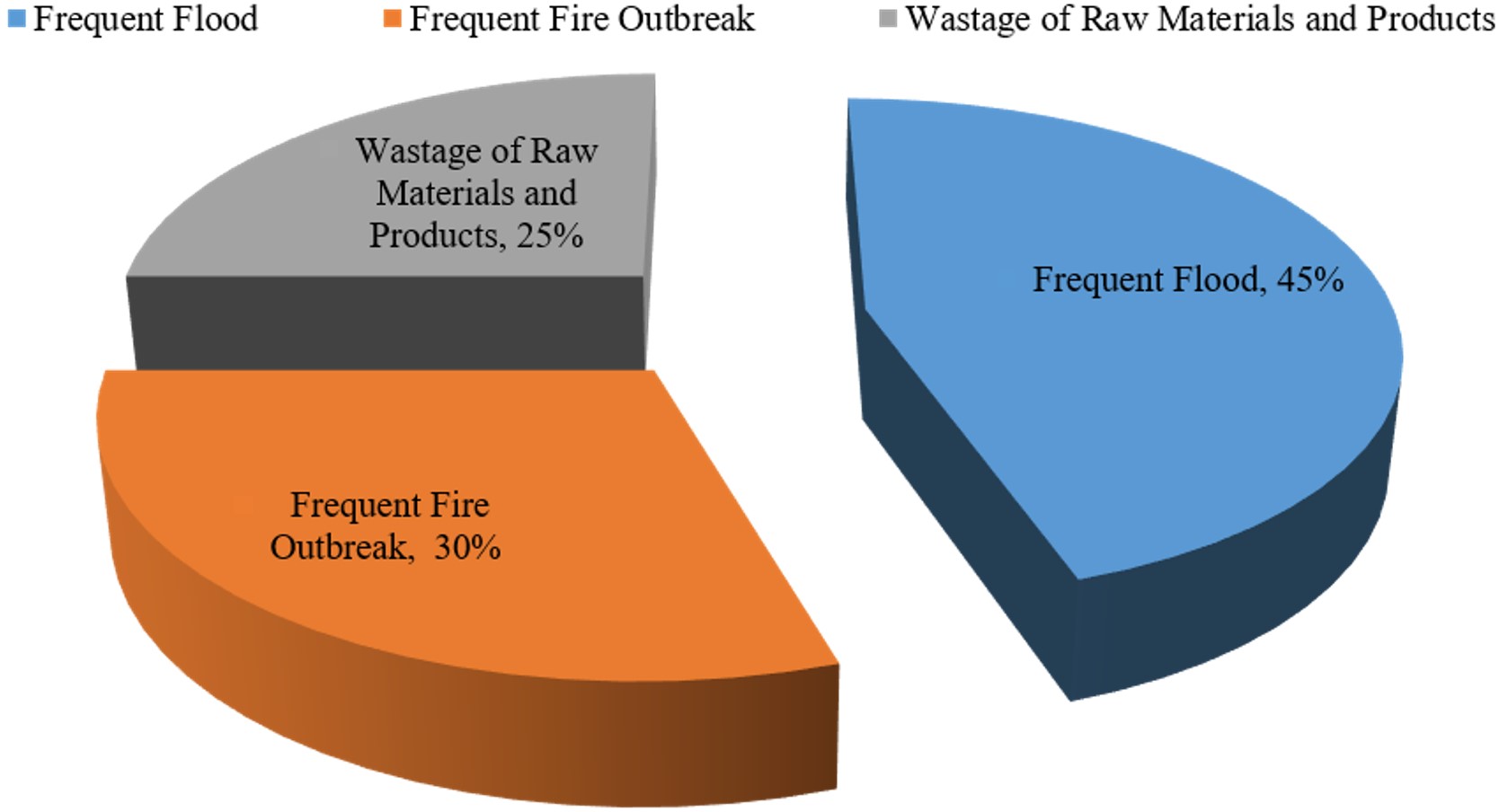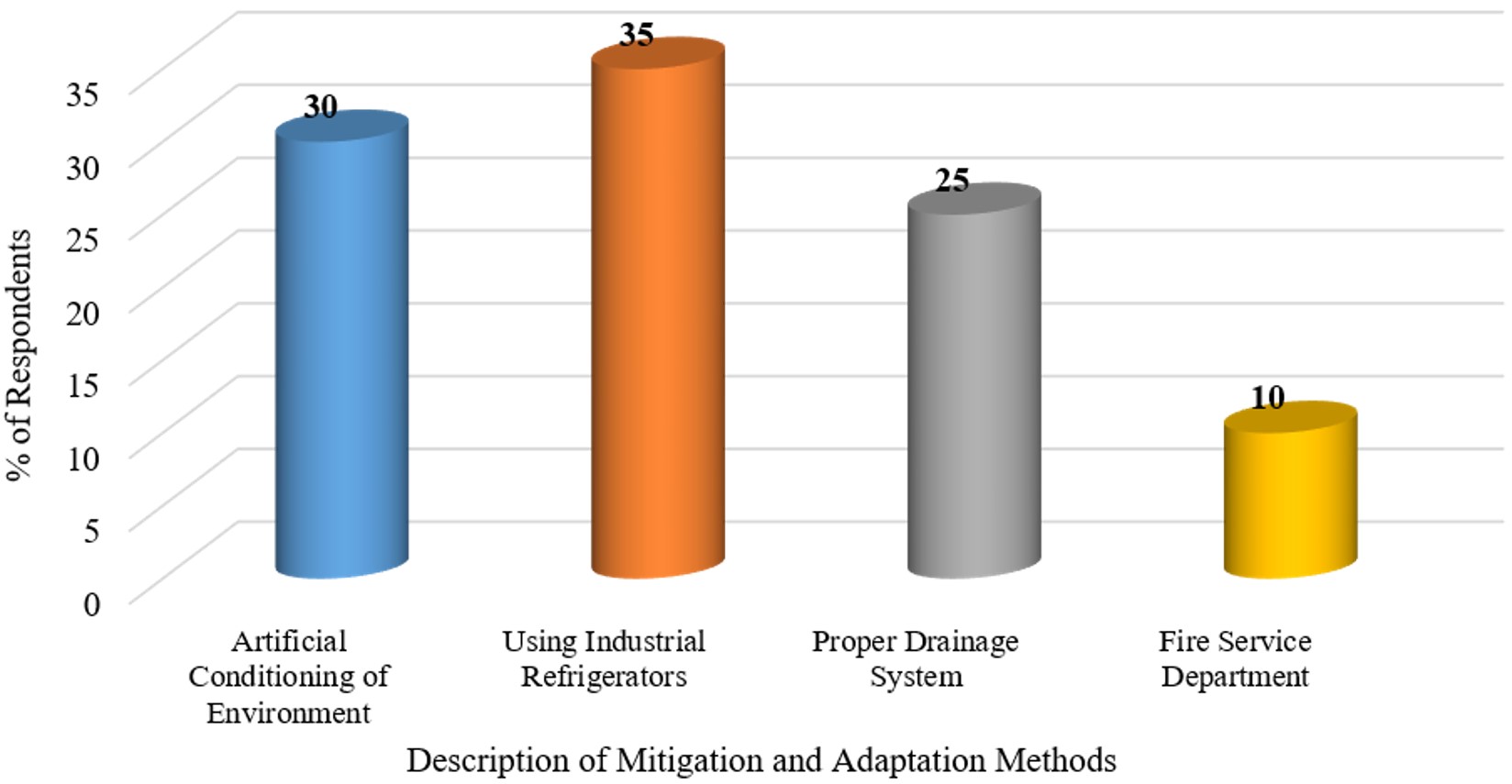Article Peer-Reviewed
Climate Change Risk Management Strategies: The Case of Small and Medium Scale Enterprises in Southwest Nigeria
1
Department of Agricultural and Resource Economics, Federal University of Technology, P.M.B. 704, Akure 340110, Ondo State, Nigeria
2
Department of Electrical and Electronics Engineering, Faculty of Engineering, University of Lagos, Akoka, Lagos 100213, Nigeria
3
Department of Electrical Engineering and Information Technology, Institute of Digital Communication, Ruhr University, 44801 Bochum, Germany
*
For correspondence.
Academic Editor:
Received: 31 December 2022 Accepted: 6 March 2023 Published: 7 March 2023
Abstract
The study determined the critical variables inducing the choice of mitigation and adaptation methods adopted by the Small and Medium Scale Enterprises (SMEs) against the effect of climate change on their enterprises in Southwest Nigeria. A multistage sampling procedure was employed to choose 200 SMEs Managers/Chief Executive Officers (100 mitigating climate change and 100 not mitigating) as respondents for the study. Descriptive statistics and a multinomial regression model were employed to investigate the data collected. The findings show that the mean age of Managers/CEOs mitigating climate change was 41.8 years, and the level of education of climate change mitigating Managers/CEOs (80.0%) was significantly different from the non-mitigating (50.0%). The net profit margin ratio for the mitigating SMEs was 32.04%, and 17.83% for the non-mitigating SMEs. The multinomial logit model showed that income, enterprise experience, access to credit, enterprise size, and enterprise type significantly induced the choice of climate change mitigation approaches used by the SMEs in the study area. The study suggested that government and Non-Governmental Organizations (NGOs) should assist SMEs by enhancing their income-generating ability to ameliorate the impact of climate alteration over the years on their enterprises.
Figures in this Article
Keywords
climate change; small and medium enterprises (SMEs); climate change risk management strategies; multinomial logit model; Southwest Nigeria
Copyright © 2023
Thompson et al. This article is distributed under the terms of the Creative Commons Attribution License (CC BY 4.0), which permits unrestricted use and distribution provided that the original work is properly cited.
Funding
The work of Agbotiname Lucky Imoize is supported in part by the Nigerian Petroleum Technology Development Fund (PTDF) and in part by the German Academic Exchange Service (DAAD) through the Nigerian-German Postgraduate Program under Grant 57473408.
Cite this Article
Thompson, O. A., Imoize, A. L., & Amos, T. T. (2023). Climate Change Risk Management Strategies: The Case of Small and Medium Scale Enterprises in Southwest Nigeria. Highlights of Sustainability, 2(1), 35–49. https://doi.org/10.54175/hsustain2010004
References
1.
Bank of Industry. (2019). Roles of Small and Medium Enterprises in Nigeria Economy. Quarterly Bulletin, 31(12), 20–33.
2.
Folk, E. (09 November 2018). How Climate Change Will Affect Businesses. Renewable Energy magazine. https://www.renewableenergymagazine.com/emily-folk/how-climate-change-will-affect-businesses-20181109 (accessed 18 November 2022).
3.
Mishra, S. (2012). Small Scale Industries: Striving and Thriving in the Era of Globalization. International Journal of Enterprise Computing and Business System, 2(2).
4.
Bryan, C. (2021). SMEs Play a Key Role in Economic Development. Jamaica Information Service. https://jis.gov.jm/smes-play-a-key-role-in-economic-development-ffolkes-abrahams (accessed 5 December 2022).
5.
National Oceanic and Atmospheric Administration. (2021). Climate Change Impact. https://www.noaa.gov/education/resource-collections/climate/climate-change-impacts (accessed 2 December 2022).
6.
Baglee, A., Haworth, A., & Anastasi, H. (2016). Climate Change Risk Assessment for the Business Industry and Service Sector. Journal of Energy, 16(2), 77–96.
7.
NBS. (2021). National Bureau of Statistics quarterly report. National Bureau of Statistics.
8.
Skouloudis, A., Filho, W. L., Deligiannakis, G., Vouros. P., Nikolaou, L., & Evangelinos, K. (2023). Coping with floods: impacts, preparedness and resilience capacity of Greek micro-, smalland medium-sized enterprises in flood-affected areas. International Journal of Climate Change Strategies and Management, 15(1), 81–103. https://doi.org/10.1108/IJCCSM-09-2022-0122
9.
Skouloudis, A., Filho, W. L., Vouros. P., Evangelinos, K., Nikolaou, I., Deligiannalis, G., et al. (2022). Assessing Greek small and medium-sized enterprises’ flood resilience capacity: Index development and application. Journal of Flood Risk Management, 16(1), e12858. https://doi.org/10.1111/jfr3.12858
10.
Hillmann, J., Bergmann, A., & Guenther, E. (2022). Benefits of Building Organizational Resilience: The Case of Climate Change. Highlights of Sustainability, 1(4), 233–252. https://doi.org/10.54175/hsustain1040017
11.
DeMarco, J. (2016). How climate change could affect food prices. The Christian Science Monitor. https://www.csmonitor.com/Business/The-Bite/2016/1217/How-climate-change-could-affect-food-prices (accessed 22 August 2022).
12.
Runde, D. F., Savoy, C. M., & Staguhn, J. (2021). Small and Medium-Sized Enterprises, Blended Finance, and Climate Change in Sub-Saharan Africa. Centre for Strategic and International Studies (CSIS). https://www.csis.org/analysis/small-and-medium-sized-enterprises-blended-finance-and-climate-change-sub-saharan-africa (accessed 22 August 2022).
13.
Thompson, O. A. (2017). Assessment of Maize Farming Household's Vulnerability to Climate Change in Southwest, Nigeria. Journal of Meteorology and Climate Science.
14.
Colnago, P., & Dogliotti, S. (2020). Introducing labour productivity analysis in a co-innovation process to improve sustainability in mixed family farming. Agricultural System, 177, 102732. https://doi.org/10.1016/j.agsy.2019.102732
15.
Thornton, P. K., Ericksen, P. J., Herrero, M., & Challinor, A. J. (2014). Climate variability and vulnerability to climate change: a review. Global Change Biology, 20(11), 3313–3328. https://doi.org/10.1111/gcb.12581
16.
Raza, A., Razzaq, A., Mehmood, S. S., Zou, X., Zhang, X., Lv, Y., et al. (2019). Impact of Climate Change on Crops Adaptation and Strategies to Tackle Its Outcome: A Review. Plants, 8(2), 34. https://doi.org/10.3390/plants8020034
17.
Bakotić, D. (2016). Relationship between job satisfaction and organisational performance. Economic Research-Ekonomska Istraživanja, 29(1), 118–130. https://doi.org/10.1080/1331677X.2016.1163946
18.
Shafi, M., Liu, J., & Ren, W. (2020). Impact of COVID-19 pandemic on micro, small, and medium-sized Enterprises operating in Pakistan. Research in Globalization, 2, 100018. https://doi.org/10.1016/j.resglo.2020.100018
19.
Nkonya, E., Johnson, T., Kwon, H. Y., & Kato, E. (2016). Economics of Land Degradation in Sub-Saharan Africa. In E. Nkonya, A. Mirzabaev, & J. von Braun (Eds.), Economics of Land Degradation and Improvement – A Global Assessment for Sustainable Development (pp. 215–259). Springer. https://doi.org/10.1007/978-3-319-19168-3_9
20.
Buis, A. (10 March 2020). How Climate Change May Be Impacting Storms Over Earth’s Tropical Oceans. NASA’s Jet Propulsion Laboratory. https://climate.nasa.gov/ask-nasa-climate/2956/how-climate-change-may-be-impacting-storms-over-earths-tropical-oceans (accessed 19 June 2022).
21.
Zhao, C., Liu, B., Piao, S., Wang, X., Lobell, D. B., Huang, Y., et al. (2017). Temperature increase reduces global yields of major crops in four independent estimates. Agricultural Sciences, 114(35), 9326–9331. https://doi.org/10.1073/pnas.1701762114
22.
United State Environmental Protection Agency. (2021). Climate Change Indicators: Wildfires. https://www.epa.gov/climate-indicators/climate-change-indicators-wildfires (accessed 6 August 2022).
23.
Ramiaramanana, F. N., & Teller, J. (2021). Urbanization and Floods in Sub-Saharan Africa: Spatiotemporal Study and Analysis of Vulnerability Factors—Case of Antananarivo Agglomeration (Madagascar). Water, 13(2), 149. https://doi.org/10.3390/w13020149
24.
Population Council. (Mar 2007). Report of Nigeria’s National Population Commission on the 2006 Census (Vol. 33, pp. 206–210). https://www.jstor.org/stable/25434601 (accessed 24 October 2022).
25.
Tulsian, M. (2014). Profitability Analysis (A comparative study of SAIL & TATA Steel). IOSR Journal of Economics and Finance (IOSR-JEF), 3(2), 19–22. https://doi.org/10.9790/5933-03211922
26.
Thompson, O. A., Arifalo, S. F., & Atejioye, A. A. (2021). Determinants of Climate Change Risk Management Strategies Among the Aquaculture Fish Farmers in Nigeria Using Multinomial Logit Model. Fisheries and Aquaculture Journal, 12(3), 274.
27.
Yazd, S. D., Wheeler, S. A., & Zu, A. (2019). Key Risk Factors Affecting Farmers’ Mental Health: A Systematic Review. International Journal of Environmental Research and Public Health, 16(23), 4849. https://doi.org/10.3390/ijerph16234849
28.
Landry, S. (January 2022). Technological innovations: Creating and harnessing tools for improved livelihoods. Foresight Africa 2022. https://www.brookings.edu/essay/technological-innovations-creating-and-harnessing-tools-for-improved-livelihoods (accessed 17 March 2022).
29.
Coppola, M., & Blohmke, J. (12 December 2019). Feeling the heat? Companies are under pressure on climate change and need to do more. Deloitte Insight. https://www2.deloitte.com/us/en/insights/topics/strategy/impact-and-opportunities-of-climate-change-on-business.html (accessed 1 May 2022).
30.
Thompson, O. A., Akintuyi, O. B., Omoniyi, L. O., & Fatoki, O. A. (2022). Analysis of Land Use and Land Cover Change in Oil Palm Producing Agro-Ecological Zones of Nigeria. Journal of Agroforestry and Environment, 15(1), 30–41.
31.
Tran, Q., Doan, A.-T., & Tran, T. (2021). Small and medium enterprises’ credit access, ownership structure and job development. Australian Economic Papers, 60(4), 710–735. https://doi.org/10.1111/1467-8454.12227
32.
Serrasqueiro, Z., Leitão, J., & Smallbone, D. (2018). Small- and medium-sized enterprises (SME) growth and financing sources: Before and after the financial crisis. Journal of Management & Organization, 27(1), 6–21. https://doi.org/10.1017/jmo.2018.14
33.
Caldwell, S. (6 May 2022). Flood Risk for South Sudan’s 2022 Rainy Season. Centre for Humdata. https://centre.humdata.org/flood-risks-for-south-sudans-2022-rainy-season (accessed 6 December 2022).
34.
FAO. (2019). Food and Agricultural Organization: The Assessment of the Socio-Economic Impacts of Climate Change at Household Level and Policy Implications, 18(3), 6–10.
35.
Mendiluce, M. (9 August 2021). Why business and government must act on the IPCC climate change report. World Economic Forum. https://www.weforum.org/agenda/2021/08/ipcc-climate-change-report-business-response (accessed 19 August 2022).
36.
Mabahwi, N. A., Nakamura, H., & Bhattacharya, Y. (2020). Flood Risk Management in Malaysia: The current hindrances for flood related agencies. Asian Journal of Behavioural Studies, 5(19), 11–24. https://doi.org/10.21834/ajbes.v5i19.190
37.
Peneder, M. (2021). Digitization and the evolution of money as a social technology of account. Journal of Evolutionary Economic, 32, 175–203. https://doi.org/10.1007/s00191-021-00729-4
38.
Ting, I. W. K., Tebourbi, I., Lu, W.-M., & Kweh, L. Q. (2021). The effects of managerial ability on firm performance and the mediating role of capital structure: evidence from Taiwan. Financial Innovation, 7, 89. https://doi.org/10.1186/s40854-021-00320-7
39.
Jain, S. (30 April 2021). International business expansion during COVID19… need of an hour and mitigate business risk? Business Economics. https://tycoonmagazines.com/international-business-expansion-during-covid19-need-of-an-hour-and-mitigate-business-risk (accessed 22 September 2022).
40.
Kamia, H., Tatiana, F., & Yoram, K. (2019). The Vulnerability of the Power Sector to Climate Variability and Change: Evidence from Indonesia. Energies, 12(19), 3640. https://doi.org/10.3390/en12193640
41.
Cameron, M. (28 January 2022). How to Change a Sole Proprietorship to an LLC. Bench. https://bench.co/blog/starting-a-business/transition-to-llc (accessed 13 January 2023).
Metrics
Loading...
Journal Menu
Journal Contact
Highlights of Sustainability
Editorial Office
Highlights of Science
Avenida Madrid, 189-195, 3-3
08014 Barcelona, Spain
08014 Barcelona, Spain
Ms.
Cathy Wang
Managing Editor


